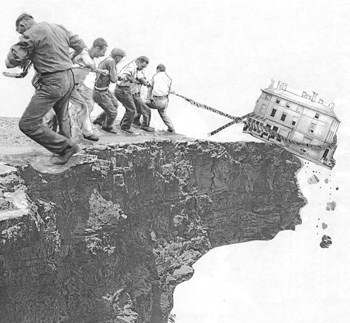
It happens infrequently, but when it does, it can be an enormous challenge: a co-op corporation or condo development has a long-running squabble with the building sponsor/developer, falls victim to long-term mishandling of funds — or outright fraud — by the board, or has to undertake a major unexpected or ill-prepared-for repair project. All of a sudden, they’ve got no money in the reserve fund, they can’t borrow against the property to make vital repairs, and residents are beginning to think they may have made a poor investment. Suddenly the whole building is on the precipice of insolvency. It’s a scary situation — but there are ways to edge back from the brink of financial wreck and ruin and get back on track. Here are some stories of communities who did just that.
Running the Numbers
At the end of the day, keeping a building solvent is about math. The money coming in has to be greater than or equal to the money going out. Extreme variation in either of the two sides of the equation can push a building towards financial difficulty. There are any number of ways, sudden or gradual, that this can come about.
The first reason is simple mismanagement. “Where communities fall into problems is when they don’t pay attention to what their building needs,” explains Enid Hamelin, longtime property manager and current board member at the Butterfield, a co-op in New York City. “They have no concept of the preservation of the structure of the building. They have not planned for it.” For example, there are a number of prewar buildings in New York, built during the Roaring Twenties. These are often coveted addresses, with their oversized apartments, high ceilings, interesting features, and so forth. But they are old. And with age comes the need for renovation. So it’s especially important in that type of building to be vigilant and plan carefully.
“What happens is that boards will low-ball the monthly fees,” says Boston attorney Saul J. Feldman of Feldman Law Office. “If they want to keep out of financial trouble, they have to be realistic about what they need. If they really need $500 a month, that’s what it should be; they shouldn’t try to make nice at $400 a month.”
And whether the condo building or community is a venerable urban high-rise or a sprawling suburban property, there are elements — from roofs to windows to boilers — that are going to require repairs and replacement as time marches on. Unfortunately, Feldman notes, many associations don’t have adequate reserves set aside for that inevitable work. “They should have an outside expert come in for a reserve study, but they just don’t do it,” he laments. “Most mortgages today are sold on the secondary market, and Fannie Mae and Freddie Mac insist” on healthy reserves — but some associations don’t even come close to what they should have. “So they fall short, then they panic and they do a special assessment, and people can’t handle the special assessment.”
It’s a familiar story: A building that has been in the black suddenly finds itself in urgent need of funds. Maybe the roof has deteriorated years before anyone thought it would. Maybe the elevators stop working. Maybe a lawsuit wasn’t decided in the community’s favor, or the damage caused by a major weather event wasn’t covered by the condo or association’s insurance. When comparing associations that have been successful to those that haven’t. Tim Haviland, senior vice president of commercial lending and community association loan program at Oak Brook, Illinois-based Inland Bank and Trust, says he looks closely at those that have—to see the financial path that they took. “One of the most important things is the personality of the association and the makeup of the homeowners,” he says. “They have the responsibility to elect good leaders. A lot of times, those that don’t, don’t understand the rules of living in an association. Once they select good leaders and board members, they need a board that sets a good budget that makes sense—with ongoing upkeep of the building and putting away reserves for repairs they know will be needed. Finally, the homeowners need to pay on time so the cash flow stream remains the lifeblood of the association.”
Even if you have a well-run association and stable reserves, something big can come along out of nowhere and change things in a hurry — an event like a hurricane, which causes a great deal of damage and causes maintenance issues that can overwhelm the association. When these events happen, boards react by doing what is necessary to raise the funds, either through assessments, tapping into capital improvement savings, or securing a new loan from a lender.
“One of the problems in condominiums,” Feldman adds, “is that you have people with different financial resources. You might have one couple that has adequate resources living next door to someone who’s working two jobs and struggling.” If a problem arises — like the elevator that fails, or extensive damage from a storm — some owners may not have the funds to cover a special assessment. And when one, or two, or a dozen homeowners run into financial difficulties, the remaining owners may end up having to dig even deeper to ensure that the work gets done — as communities across the country saw during the “Great Recession” that began in 2008.
Slow Starvation
The professionals note that financial disrepair is commonly caused by three different scenarios or a combination of the three.
Scenario one involves owners who have been hit by a difficult financial crisis, such as the previously-mentioned recession. That will cause more unit owners than normal to stop paying their assessments. Lack of payments will deplete the cash reserves and cause financial disrepair.
The second scenario, as noted by Feldman, involves not funding adequately for reserves over multiple years, leading to those dreaded words: “special assessment.”
The third scenario comes from not maintaining the property correctly. When assessments are kept artificially low and the property is not maintained, future special assessments will usually follow eventually.
“The problem is that boards defer maintenance,” Feldman says. “When the condo is struggling financially, they don’t do the work that’s necessary. Putting off needed maintenance not only leads to bigger, more costly, problems down the road, but can also create safety hazards — which can lead to lawsuits and even more expense for the community.
Finances can also be stressed when boards are too lenient on delinquent owners, says Brad Schneider, CPA, a certified fraud examiner and president of CondoCPA in Elmhurst, Illinois. “A system has to be in place so that when an owner does not pay, they know the association will aggressively follow up,” he says.
That these failures are not sudden doesn’t make them any easier to manage. It’s like waiting for a tsunami to hit. “When the shareholders or co-op owners aren’t paying, there’s usually a lead time,” says Jeffrey Reich, a partner with New York City-based law firm Schwartz Sladkus Reich Greenberg Atlas LLP. “We have two units in arrears, then we have 5%, then 10%, then it’s 20%. The next thing you know, the boat is sinking.”
Steady As She Goes
So how do co-ops and condos in dire financial straits right the ship? “It’s like anything else,” Reich says. “The first step is admitting you have a problem.” The worst thing that a building or community can do is see the beginnings of a financial fallout and do nothing, hoping the problem will just go away. Savvy boards, managers and financial advisors need to meet the problem head-on and work together to reverse a bad situation.
From there comes an honest assessment of the underlying causes. “A board has to get arms around income and expenses,” Reich says. “If income is not being collected, they have to take necessary measures to get residents in arrears to pay. Pursue collection. Foreclosure, lawsuit, notifying lenders. [Boards] have to aggressively attack income issues. Try to cut costs. See what they can do to recapitalize, that is refinance.”
Feldman recommends that associations do some self-examination, and may want to look at amending and re-stating the condo trusts. “A lot of condo associations were set up in the ‘70s and they’re archaic,” he says. “We bring them into the 21st century.” Along with updating rules about smoking — or rental situations like Airbnb, a “hot” issue in 2016 — a re-statement will also bring documents into line with issues like current Fannie Mae and Freddie Mac regulations.
Then it’s all about instituting best practices, to make sure a bad situation doesn’t recur.
And Feldman says that transparency is the best policy when it comes to association finances. “Call a meeting of the unit owners. Explain that we need money to operate, and we all need to live together. Show people the budget, and go through it, explaining why we need the money to do things,” he suggests. Associations, he says, “have to be realistic; they’re not going to have a wealthy benefactor come in and solve their problems.”
Knowledge of the building is also critical. “Walk the building,” Hamelin advises. “Walk the roof. Ask about the pipes. Find out how much the average employee gets paid. The hallways, the elevators, the security system, the laundry room. You have to know what your product is before you make any judgments. You can do this in a couple of hours — an education you don’t get if you just meet once a month.” And even this might not alone solve all problems down the line. “Any building can step into tar,” Hamelin says. “Really. It’s just one of those things.”
“Taking those measures, buildings turn around,” says Reich. “How long does it take? Depends on how deep a problem it is. It could take years.”
Greg Olear is a published novelist and a regular contributor to New England Condominium. Associate Editor Pat Gale contributed to this report.






Leave a Comment